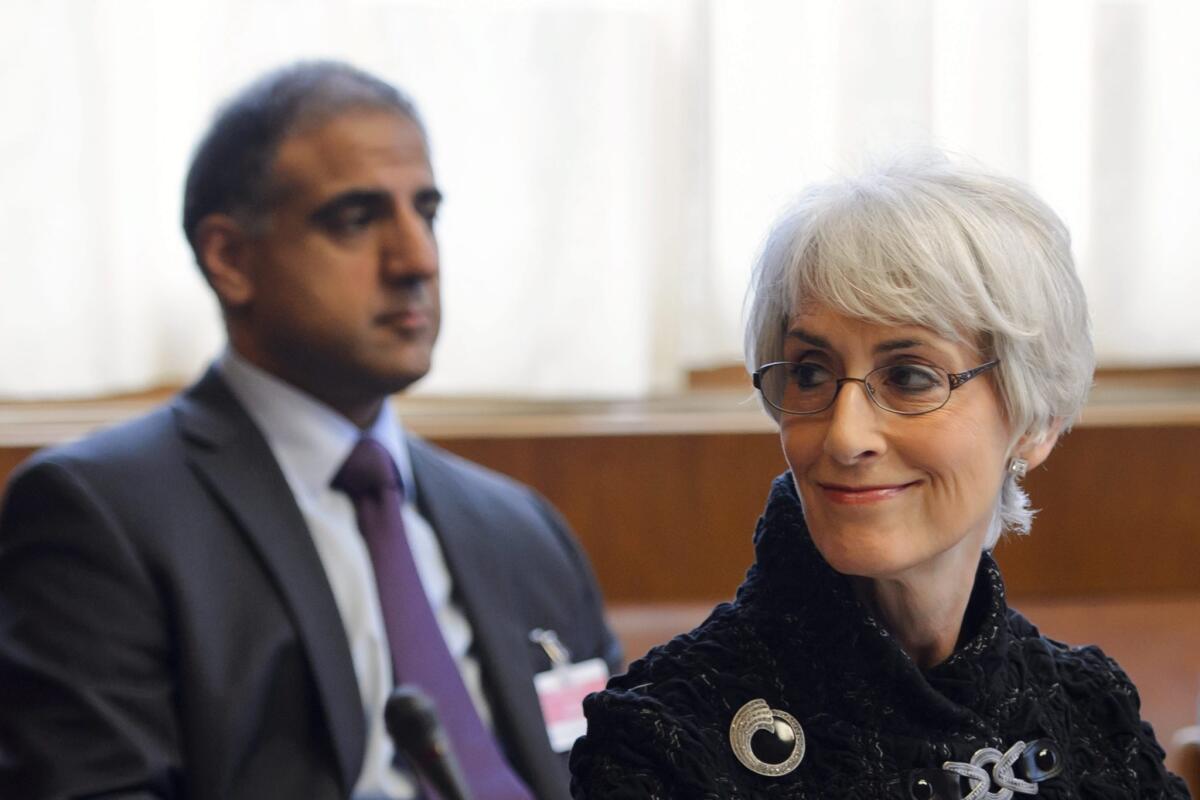U.S., Iranian diplomats hold face-to-face meeting as talks begin

- Share via
GENEVA – Iranian and U.S. diplomats held a rare one-on-one meeting Tuesday as six-power talks got underway at a United Nations palace.
In another sign of easing tensions between Washington and Tehran, a team led by U.S. Undersecretary of State Wendy Sherman met with one led by Deputy Foreign Minister Abbas Araghchi for an hour Tuesday evening. It was only the second such U.S.-Iranian bilateral meeting in seven years of diplomatic efforts by a six-nation group that has been seeking to resolve the conflict over Iran’s nuclear program.
The meeting at the U.N.’s Palace of Nations capped a day which began with Iran’s foreign minister, Mohammad Javad Zarif, laying out, in an hourlong English-language PowerPoint presentation, a plan to resolve the 2-decade-old conflict. Zarif’s title for the presentation suggested his goal: “Closing an Unnecessary Crisis – Opening New Horizons.”
U.S. officials said in a statement that the evening meeting was “useful” though “expected,” in light of Secretary of State John F. Kerry’s private meeting with Zarif on the sidelines of the U.N.’s annual meeting on Sept. 26.
The diplomacy began amid high expectations because of two months of overtures between the United States and Iran, which have stirred speculation that the two countries may be ready to solve the nuclear dispute and possibly start restoring their relationship. On Sept. 28, President Obama broke three decades of top-level silence by speaking to Iranian President Hassan Rouhani by phone.
Yet though U.S. officials praised the Iranians for their willingness to delve into technical details, it was not clear that the Iranian delegation had given the Americans what they wanted to hear about curbing the nuclear program. Zarif and Araghchi spoke mostly in broad terms about their goals, diplomats said.
Iranian officials, who are eager to ease sanctions on their economy, have in recent days promised to present a broad “road map” that would chart the path to a resolution of the dispute over the nuclear program, which many nations fear is aimed at developing a nuclear weapons capability. Iranian officials have said in private meetings that they would agree to stop production of medium-enriched uranium, which is of special concern to the West because it is easily converted into nuclear bomb fuel.
Catherine Ashton, who is the European Union’s foreign policy chief and point person for the six countries, also met privately Tuesday evening with Zarif.
ALSO:
Afghanistan governor assassinated in mosque bombing
Only Muslims can call their deity Allah, Malaysian court rules
No African leader found worthy of $5-million good governance prize
Times staff writer Richter reported from Geneva and special correspondent Mostaghim from Tehran.
More to Read
Sign up for Essential California
The most important California stories and recommendations in your inbox every morning.
You may occasionally receive promotional content from the Los Angeles Times.











